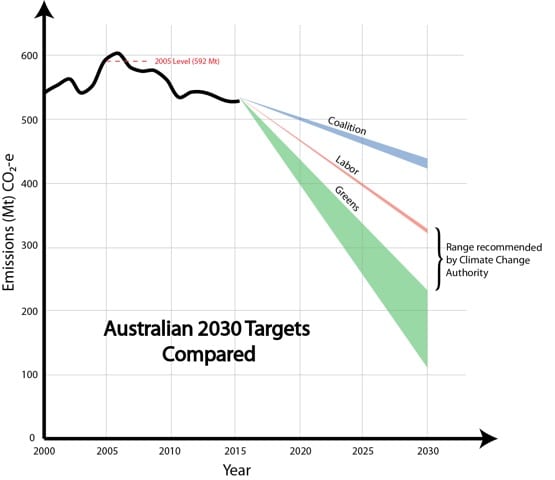As we head into the final sprint of another Federal election, I thought it would be valuable to cut through the spin (or at least attempt to) and revisit how the three main parties stack up against each other on their long-term emission targets, a reliable proxy to how serious they really are about climate change.
Before we dive into the details, it’s worth bearing in mind a couple of recent events that may be relevant.
Firstly, on Earth Day this year we formally signed the global Paris Agreement. To demonstrate our commitment during the Paris conference last year, we even joined the “high ambition coalition” who were instrumental in the inclusion of the lower (and much harder) 1.5°C limit in the deal.
Amongst other things, it commits us to:
“Holding the increase in the global average temperature to well below 2 °C above pre-industrial levels and to pursue efforts to limit the temperature increase to 1.5 °C above pre-industrial levels, recognizing that this would significantly reduce the risks and impacts of climate change;”
Secondly, we’ve just witnessed what Professor Justin Marshall of the University of Queensland has called “Australia’s biggest ever environmental disaster”: a massive bleaching event that led to the loss of nearly a quarter of the entire Great Barrier Reef, mostly in the pristine northern end.
Personally, I can’t think of a clearer impact that climate change has had specifically on Australia. Despite a few notable exceptions, the silence on this unfolding tragedy is deeply perplexing.
A concern that repeatedly comes up in discussions on climate change is the fact that we’re only responsible for a small percentage of emissions, therefore nothing we do matters much. Apart from this being a great excuse not to act, it’s simply not true.
Our long-term emission targets are important not just in their own right but because they can strengthen or weaken the only tool (the Paris Agreement) that has the capacity to limit the damage to our nation through escalating impacts of climate change, including not just the complete decimation of the Great Barrier Reef, but a host of things that could potentially tip us into a very hostile future.
In return, what it requires from us is long-term political and social commitment to deep targets. According to modelling done by The Climate Institute, for example, Australia’s commitment to the Paris Agreement translates to closing all our coal-fired generators before 2035, and reducing emissions to net zero by 2050.
So now let’s have a look at how the parties compare on these long-term commitments:

It’s no surprise that when ranking the three major parties from most to least ambition, the Greens win, followed by Labor, with the Coalition coming last.
Firmly occupying the middle ground is Labor, sitting just within the range recommended by the independent Climate Change Authority (CCA) as commensurate with Australia contributing fairly to its international commitments.
Despite dramatically changing leaders to someone who clearly grasps the magnitude of the problem, the Coalition hasn’t yet changed their targets, disappointing many who held out high hopes of an equally dramatic shift on this issue. With the current Direct Action policy as it stands, there are many lingering doubts as to whether it is up to the job of meeting their low targets.
A simple, but crude, yardstick on the credibility of the targets is to note the date at which their midpoint projection hits zero emissions and how far away it is from the middle of the century. Using this measure, we see that Labor is roughly in alignment with the Paris Agreement coming in a shade past 2050. The Greens are a few years ahead of schedule as expected. Disappointingly though, the Coalition’s zero crossing doesn’t occur until after 2090.
Labor have surprised many recently, myself included, with the strength of their climate commitments. Their formal adoption of a strong position wouldn’t have happened, however, without intensive behind-the-scenes work from the Labor Environmental Action Group (LEAN) in their effort to get the issue firmly on the agenda at the 2015 National Conference.
As LEAN put it in their blog:
“After 9 months of campaigning, thousands of conversations with key decision makers and support from more than 370 branches LEAN won its campaign to put climate change back in the heart of Labor’s policy vision.”
I continue to find it remarkable what a few committed people can achieve if they set their minds to it. For better or worse, this can cut two ways. As we’ve seen so far by the divisive nature of climate policy in Australia, we’ve had shining examples in both directions.
Steve O’Connor is a Climate Leader with the Climate Reality Project. He tweets at @stevepoconnor










